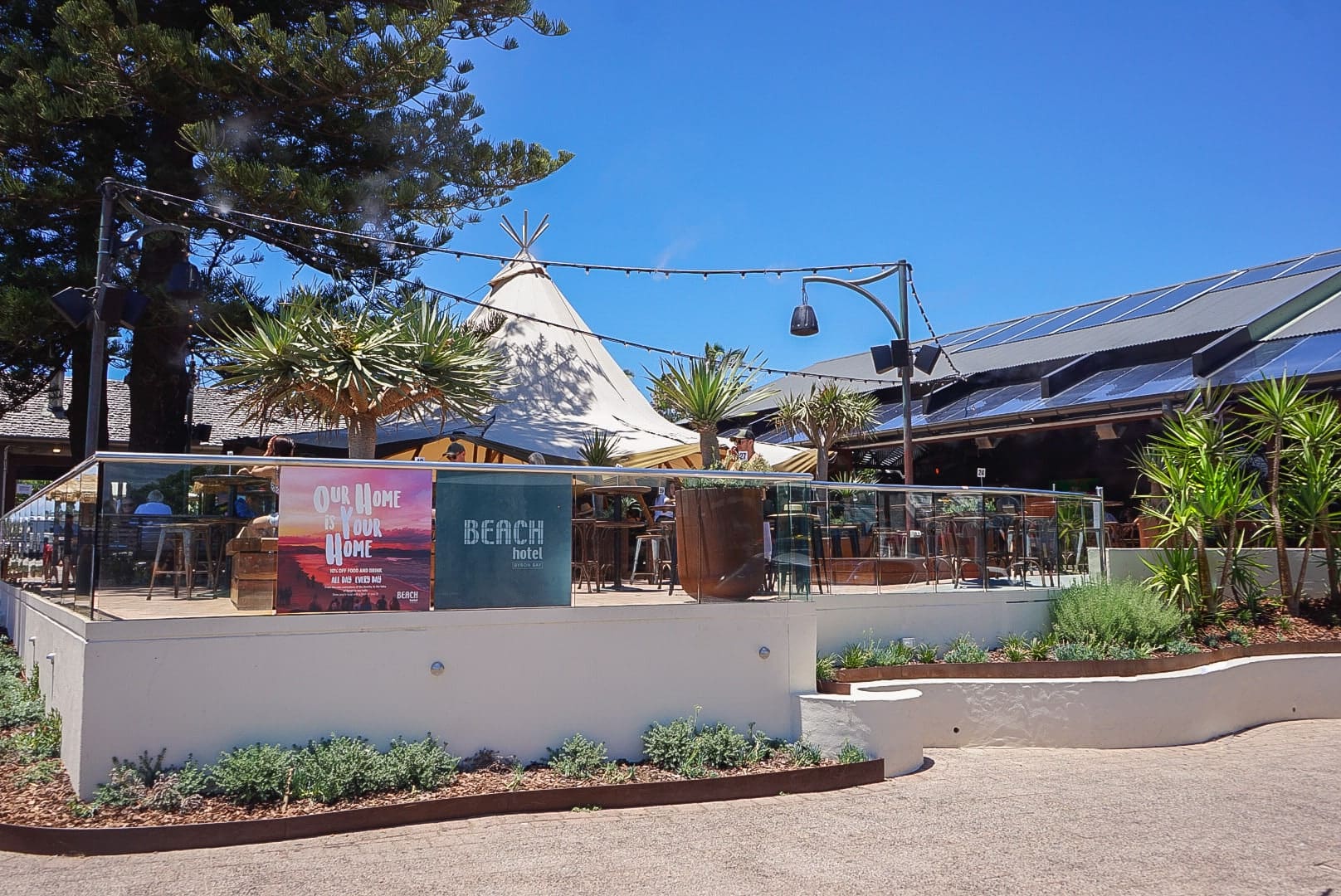
The kitchen and bar at the Byron Bay Beach Hotel were overdue a redesign. The venue was struggling with a lack of flow and efficiency, and labor costs were high as a result. Communication and movement between the kitchen, bar, and warewashing areas needed to be carefully restructured so the venue could operate at its full potential.
FCSI Senior Associate Bruce Fathi, CEO and founder of Hexa Design, got involved in the redesign in 2020 when an equipment supplier put him in touch with Redcape Hotel Group (the hospitality group that acquired the Beach Hotel in 2019).
“At the crux of this project lay the challenge of optimizing the available space to maximize efficiency,” says Fathi . “The kitchen was dramatically old and there were some areas that were not being used properly. With limited room to maneuvre, our team was determined to create a kitchen layout that seamlessly blended functionality and aesthetic appeal.”
In any project of this scale, there are going to be competing expectations to be factored into the design and delivery. Fathi has found that managing these is fundamental to a successful outcome.
“Business owners tend to have a budget in mind, space and aesthetic considerations, and operational efficiency goals,” he says. “Chefs, on the other hand, care about workflow, speed, and quality, and may have special requests or preferences. Finding the right balance between those differing needs can be a challenge. But it’s important to remember that optimal kitchen design and equipment selection are crucial for a restaurant’s success.”
Going into the project, executive chef Matt Kemp wanted to maximize the available kitchen space so they could “upscale food output in the summer months and still operate in the quieter ones without there being any disconnect from the sections”. He wanted safe and hygienic workspaces that included robust well-engineered equipment that could be maintained locally.
Lessons learnt
Improving flow and efficiency was key to all elements of the Beach Hotel redesign project. Moving the pizza oven from the bar and into the main kitchen area resulted in better staff communication and reduced labor requirements. A single warewashing area with Winterhalter warewashing systems replaced separate glass washers that hitherto were located in the bar, helping to streamline table clearing and dish sorting.
“We put two rack conveyor machines with a central sorting area so everything can be collected and sorted in the same spot. Glasses get sorted into the baskets and pushed through the glass wash unit on one side and dishes through the main unit on the other side,” Fathi explains.
Balancing expectations
Increasing the venue’s ice-making capacity was also a priority. “It is a very hot environment going through a big number of people… having a good amount of ice is important,” says Fathi, recalling his early meetings with Redcape Hotel Group. To deal with this demand, a Scotsman ice machine was installed to service the venue.
During the redesign, matters were complicated by the lack of detail in the original technical drawings of the space and they had to be recreated. “Interior designers are great for front of house vision and concept, but when it comes to the technical requirements, they have limited knowledge,” Fathi says.
He goes on to explain that the team at Hexa Design gains their knowledge through a variety of resources. They go to trade shows, supplier trainings and product presentations to find out what is in the market and how to best incorporate it into projects to benefit their clients. And on the technical side, they talk to tradespeople to discover potential problems, and then relay this information back to the kitchen, talking with the chef and the business owners. ‘The more we know, the better we can deliver,” Fathi says.
The renovations were completed in stages, which allowed the venue to remain open throughout, and were undertaken between 2020 and 2023. The timing was made more challenging due to labor shortages and delivery delays during the pandemic.
“Because logistics were one of the biggest problems around the world during the pandemic, the lead time of some equipment went from 10 to 12 weeks to even 26 weeks, so we had to find other solutions. For example, in one of the bars, we couldn’t get the fridges in time, so we had to find temporary solutions, some temporary fridges that could be modified to get to the optimum design down the track,” says Fathi.
Optimization in action
The Beach Hotel has long been a Byron Bay institution due to its prominent beachside location. The redesign has improved flow and efficacy in service and food delivery, resulting in happy customers and staff that can work effectively during the venue’s busy periods, and in the quieter ones. Kemp reports that the renovations have met expectations, providing staff with more room to manoeuvre, and that the new equipment is of a high standard.
Fathi explains that running a successful food service businesses in a post-pandemic climate can be challenging. “It’s more important than ever to explore ways to optimize kitchens, reduce labor costs and increase efficiency,” he says. The redesigned Beach Hotel demonstrates this optimization in action. In testament to the success of the project, Fathi and his team at Hexa Design have continued to work with Redcape Hotel Group on over five new projects, including the Aspley Hotel and the Shafston Hotel.
Victoria Brownlee
